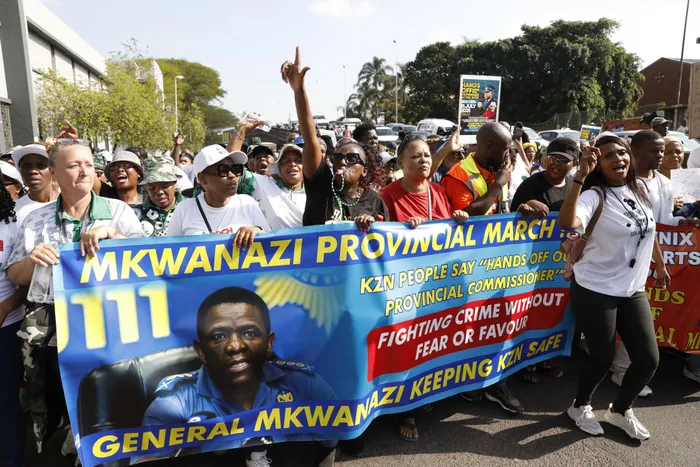Why South Africans are losing trust in their security forces

Hundreds marched on the streets of Durban on Tuesday, calling for "Hands Off Mkhwanazi".
Image: Doctor Ngcobo/ Independent Newspapers
There is a quiet, growing disillusionment in South Africa.
One that isn’t expressed in protest or petitions, but in silence. People no longer expect the system to protect them — not from criminals, not from corrupt politicians, and indeed not if they decide to speak out. Confidence in the country’s security cluster is in freefall, and the state’s latest handling of Minister Senzo Mchunu’s scandal has only deepened the sense that truth and accountability have no place in today’s political landscape.
On July 13, President Cyril Ramaphosa placed Police Minister Senzo Mchunu on special leave, following explosive allegations by KwaZulu-Natal police commissioner Lieutenant General Nhlanhla Mkhwanazi. The commissioner accused Mchunu of colluding with criminal syndicates, interfering in politically sensitive murder investigations, and using his authority to disband a task team probing over a hundred unsolved political killings. The accusations, if true, represent one of the most brazen breaches of public trust by a sitting minister in recent memory.
Yet despite the severity of the claims, Mchunu has not been fired. He hasn’t even been suspended without pay. Instead, he’s been quietly placed on paid leave while a commission of inquiry is established. And just like that, a man accused of undermining the very foundations of justice is allowed to retreat — salary and benefits intact — while the public waits, once again, for answers that may never come. The optics of this decision are catastrophic. At a time when public trust in the police has dropped to an all-time low — a recent HSRC survey found only 22% of South Africans have confidence in SAPS — the president’s response appears more like damage control than leadership. And for whistleblowers, it sends a devastating message: the system doesn’t just fail to protect you; it may actively reward those who put you in danger.
This isn’t a theoretical issue. Whistleblowers in South Africa operate in one of the most hostile environments in the democratic world. Those who expose corruption or criminal wrongdoing often face threats, intimidation, legal harassment, or even death. Babita Deokaran’s assassination in 2021 was not just a tragedy — it was a signal that speaking out in this country can be a death sentence. Since then, government promises to strengthen whistleblower protection laws have amounted to little more than lip service.
Draft proposals to reform the Protected Disclosures Act have yet to materialise into action. Civil society groups have repeatedly called for a comprehensive system that includes safe housing, financial support, legal assistance, and psychological care for whistleblowers. But those calls continue to go unanswered. Now, in the wake of the Mchunu scandal, the stakes have never been clearer. If a police minister can be accused of sabotaging investigations and remain in office, even temporarily, what hope is there for those who come forward with information that implicates people in power? A judicial commission, led by acting deputy-chief Justice Mbuyiseli Madlanga, has been tasked with investigating the allegations. Its scope includes not just Mchunu’s conduct, but broader issues of interference in the justice system by political actors. It is a necessary process, and if handled with urgency and transparency, it could restore some faith in the rule of law. But South Africans have seen this play before. Commissions that take months, sometimes years, to deliver findings. Recommendations that gather dust. Promises that fade into the next news cycle.
The danger isn’t just that whistleblowers will stop coming forward. It’s that the public will stop caring. When accountability becomes a performance, people turn away. When justice is delayed indefinitely, it begins to resemble impunity. Ramaphosa came into office promising to clean up the state, rebuild trust, and restore integrity to public office. However, his leadership has often favoured caution over conviction. Political stability has come at the expense of moral clarity. At this moment, South Africans don’t need another commission. They need a firm, unambiguous stand — a declaration that those who compromise justice will not be protected by proximity to power.
It’s not too late. The president can still act decisively. He can remove Mchunu from his position, demand expedited action from the inquiry, and push forward urgent reforms to protect whistleblowers. These are not radical demands — they are the minimum standard in any functioning democracy. The next whistleblower is out there. They might be a municipal clerk, a junior accountant, a medical officer, or a police officer with a conscience. They’re watching the Mchunu case unfold. They’re reading the silence. And they’re asking themselves one very human question: is it worth it? Right now, the answer is uncertain. But if the president and his Cabinet fail to act swiftly and honestly, the silence that follows won’t be peaceful — it will be the silence of a society giving up.
*Mayalo is an independent writer and analyst. The views expressed are not necessarily those of IOL and Independent Media
Related Topics: